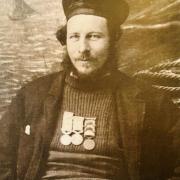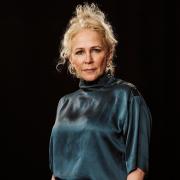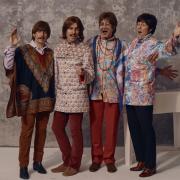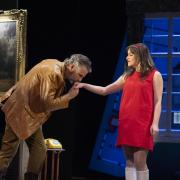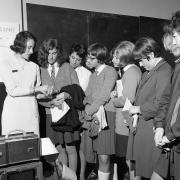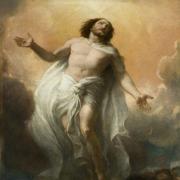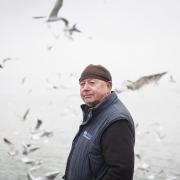Robert Arthur Jones was a renowned watch and clockmaker who transformed Southend with his philanthropy and believed it was a sin for a man to die rich. It’s ironic that when he did die, time literally came to a standstill in the town as record numbers turned out for his funeral…
Not many people are so well remembered in history that they get their own statue. Robert Arthur Jones does- and if anyone is deserving of such an honour, it is him.
Jones was born on November 20, 1849. He was raised in Liverpool but moved to Southend after working for a clock and watchmaker in Manchester. In 1890 he set up his jewellery business at 76–78 High Street Southend, employing 40 workers at the shop’s peak.

For decades the grand clock above his shop dominated the street scene at the bottom end of the High Street – and it still stands today thanks to a recent restoration project. The clock was known for its accuracy and Jones would often personally inspect it at 10am each day.
He went on to become one of the most important benefactors of the town. Known as the ‘statesman of generosity’ he gifted land, buildings, and money to Southend – leaving a legacy that has shaped the face of the city today.
His acts of benevolence included donating Priory Park in Prittlewell to the people of Southend in 1917. Having negotiated the purchase of the historic priory and the land, he said: 'I think it is a sin for a man to die rich, it is a great privilege to me to be able to do this, for I believe strongly in facilities for recreation.'

Renowned for his love of sports and recreation, he also donated the Victory Sports Ground public park and Jones Memorial Ground to the people. He had approached the town council in December 1920 to ask about donating the 13 acres sit in Sutton Road, then known as Pratt’s Field – to the people of the borough. He decided it should be called the 'Victory Recreation Ground' in honour of the many sports men who had given their lives in the Great War.
The reason Mr Jones made the gift is because he felt so badly that demobbed lads coming back from the war were unable to form clubs or get together to play sport due to a lack of open spaces in the borough. He said: 'It struck me as being particularly hard on the men, who had done so much for us, that when they came back to this land ‘fit for heroes’, there was not even a portion of the soil which they had sacrificed so much to defend, on which they could enjoy various sports they had been playing in the service.'
At this time, many amateur football matches were played at Shoebury Garrison or the Kursaal in Southend, but there was no dedicated space for local clubs to meet and practice.

Southend, like all towns in the UK, faced rising unemployment in the aftermath of the war, which was still so fresh in the minds and nightmares of the returning soldiers – many of whom were maimed and disabled. Often, their only solace was in community sport. This is something Jones understood very well. He was president or vice president of literally hundreds of sport clubs in Southend. He was even president of the Southend chess club as a keen player of the game himself.
Mr Jones made a point that the ground was to be used by “both sexes” to play whatever they wanted. He made one rule – that on 12 days of the year the ground could be used by the council for charity function or fetes and fairs. He also said he wanted the ground fenced in with an iron gate of at least five feet height and six foot wide so that it would be safe for children.
Jones threw himself into community events. He was a member of the Town Council for several years. But it was sporting endeavours that captured his interest the most. In the early 1900’s Greco-Roman style charity wrestling matches were all the rage and were frequently held at the Royal Hotel in Southend. Jones always got involved and he performed the job he was best suited for at the matches – he kept the time.
In 1919 Jones was given an honorary freedom of the borough in recognition of his philanthropy. Perhaps one of his biggest passions was his fight to change the name of Southend to ‘Thamesmouth’.
Jones came up with the idea in 1907 and wrote an open letter to the people of Southend suggesting the name change. He was adamant the name would bring a certain gravitas to Southend – and would help draw in more tourists: 'We should get a great many more visitors here, because, although it seems to be the custom for Londoners to sneer and make little of our grand River Thames – it is not so with people on the continent, or with the people of the north or midlands,' he stressed. 'And it is not so with the Americans. These people have a great veneration for old ‘Father Thames’ and I maintain that if we called this district ‘Thamesmouth’ we should get Americans running down from London in shoals.'
His Thamesmouth obsession didn’t wane and at times it came close to happening. However, ‘Southend’ in the end was the victor. Jones, however, didn’t let it drop. Census records show that in 1891 he was living in Milton Terrace, Southend. In 1901 he lived in High Street, Prittlewell but by 1921 he was living in Clifftown Parade – and the name of his house? It was called ‘Thamesmouth’ of course.
In many of these homes Jones lived with his beloved wife, Emma Julia. She died in November 1912 after the couple had been together for 35 years. In a memorial tribute he described her as a 'his wife and sweet companion' and 'one of the best women in Southend.' She clearly shared her husband’s caring sensibilities. Her funeral was a grand affair, with tributes paid by countless mourners. One of them was an impoverished local bootblack named ‘Benny’ who wheeled himself to the church in a wheelchair Mrs Jones had given him. He spent a while quietly mourning his friend at her funeral.

Mrs Jones’ funeral, although big, was nothing as elaborate as her husband’s when his time came. Robert Arthur Jones died on May 23, 1925, and ironically time seemed to come to a standstill in Southend on the day of his funeral.
Thousands of people lined the streets as his funeral cortege made its way from his home in Cliff Town Parade to St John the Baptist Church for his funeral service. In fact, the Southend Pictorial newspaper estimated 'half the population of the borough' filed out onto the streets to pay their respects in scenes 'unprecedented in the town’s history.'
The bandstand at the Cliffs fell silent and lessons in every school in the borough were halted as teachers performed their own mini memorial services in their classrooms in honour of Jones.
Jones was interred in the Cloister Garth in Prittlewell Priory. It had been his long time wish to be buried there and as such permission from the Ministry of Health and the Home Office had to be secured.
A choir made up of students from the Bournemouth Park Road School led the singing of the hymn Brief Life is Here our Portion at the graveside as more than a hundred wreaths were laid, many by representatives from schools, athletic and sporting groups in the borough.

Tributes from Southenders from all walks of life were paid to Jones at the funeral. He was described as 'a man of simple integrity whose word was his bond' and as a 'man with very broad and deep sympathies which he ever put into practical shape.'
'He would give back to the town something of what the town gave to him,' said one mourner statesman. 'He recognised the unique opportunities that any growing community afforded but he was never unmindful of what he owned to the rising town and as his fortune grew – so did his generosity.'
His business was continued by his son, Edward Cecil. It suffered severe damage during World War Two when, in October 1942, the area was hit by a Messerschmitt attack. The store finally closed in 1979, when it was replaced by a Lavells newsagents. Two years after Mr Jones’ death a beautiful oak chancel screen was erected in his memory at St John’s Church in Southend.
A few years ago, a statue of Jones was unveiled within the Centenary Garden of Priory Park – the place Jones personally gifted to the town. The fibreglass and concrete statue was created by artist David Taylor.








